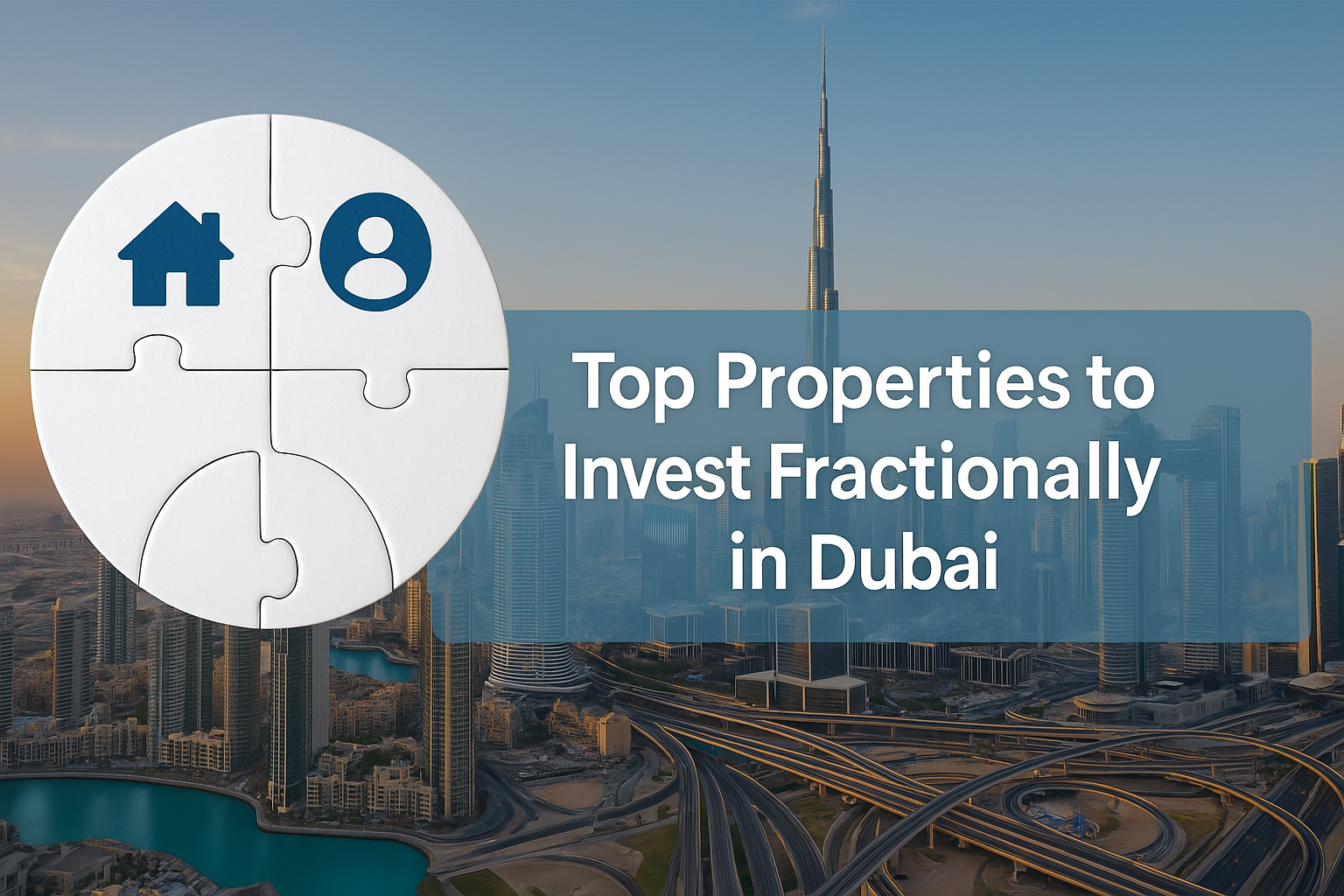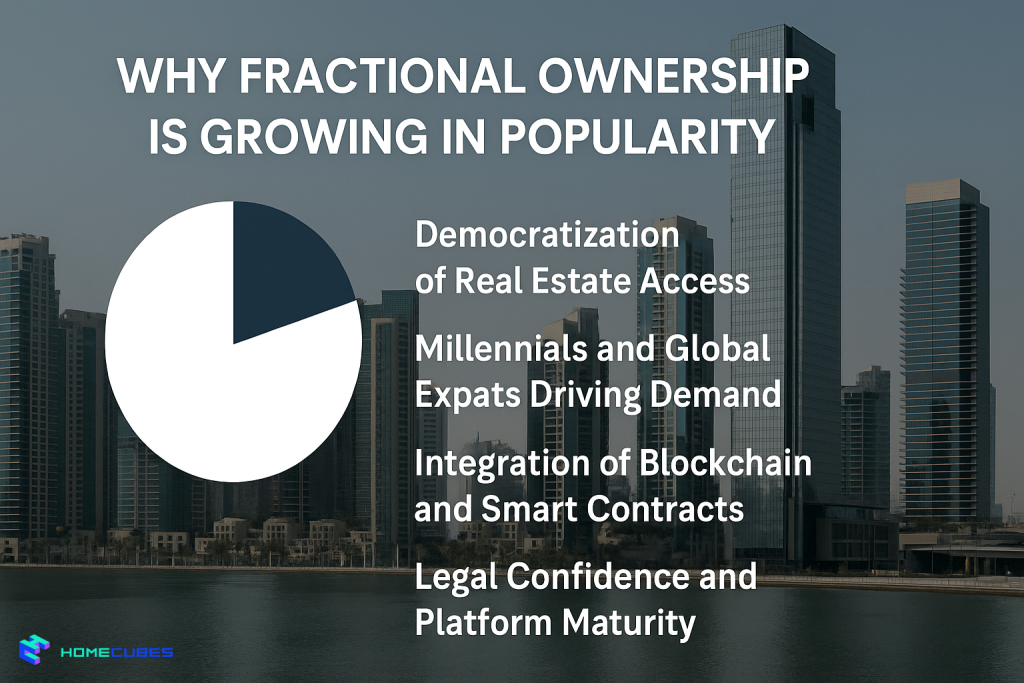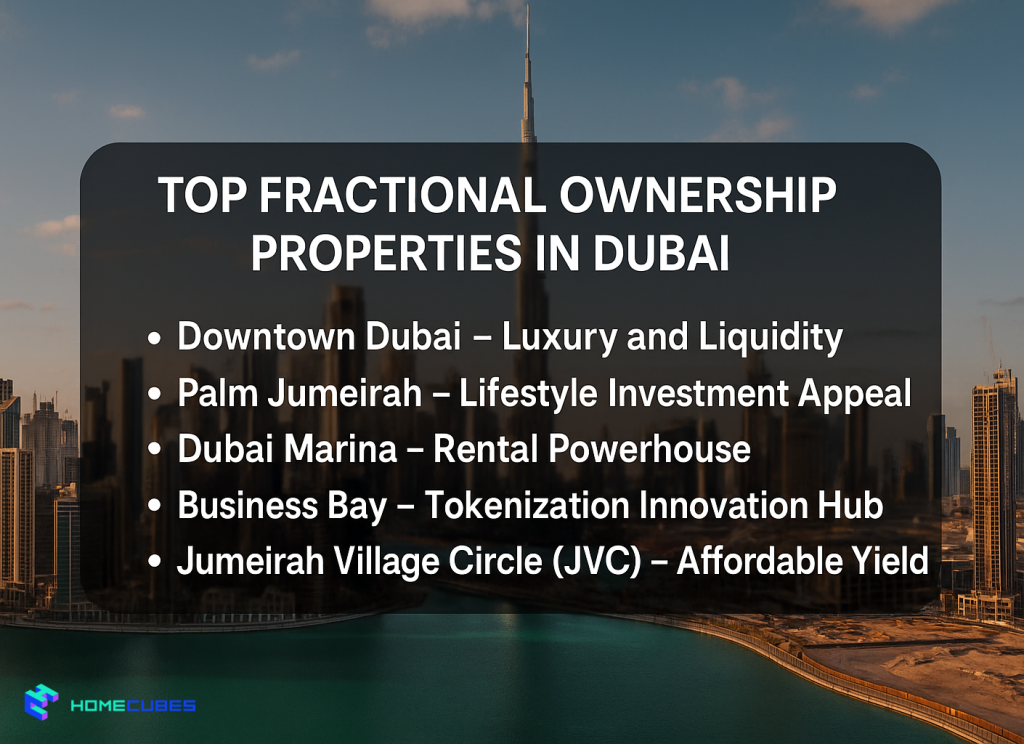

Table of Contents
- Introduction
- Understanding Fractional Ownership in Dubai
- Why Fractional Ownership Is Growing in Popularity
- Top Fractional Ownership Properties in Dubai
- Case Study: Fractional Investment in Dubai Marina
- Fees and Operational Costs
- Risks and Challenges of Fractional Property Ownership
- Mistakes to Avoid
- Market Outlook 2025–2026
- Frequently Asked Questions (FAQ)
- Final Thoughts
- Homecubes Support and Invitation
- SEO Title and Meta Description Options
Introduction
Dubai’s real estate market continues to attract global investors — yet, the barrier to entry has long been the upfront cost of owning premium property. In 2025, a new wave of innovation is reshaping this dynamic: fractional ownership properties Dubai are opening the door to investment opportunities that were once limited to institutional buyers or high-net-worth individuals.
By allowing multiple investors to share ownership of a single property, fractional models are redefining real estate accessibility, liquidity, and diversification. Platforms leveraging blockchain, tokenization, and smart contracts now enable investors to buy property fractions securely and transparently — while complying with the UAE’s evolving property laws and financial regulations.
🚨 BREAKING: Dubai just launched a $16B tokenized real estate project on XRP Ledger.
Buy property for just $500.
Habibi money is loading. #RWA 🚀 pic.twitter.com/rdYpptVzoj
— Real World Asset Watchlist (@RWAwatchlist_) May 26, 2025
This article explores Dubai’s most promising fractional ownership projects, the market forces behind them, potential risks, and how platforms like Homecubes aim to make fractional investing fully compliant under VARA’s upcoming licensing framework.
Understanding Fractional Ownership in Dubai
To get started to fractionally invest in UAE real estate, you must firstly understand the concept. Fractional ownership refers to shared investment in a physical property, where multiple buyers collectively own portions of the same real estate asset. Unlike traditional timeshare models, investors actually own equity shares in the property and benefit from both rental income and capital appreciation.
In Dubai, this model is typically facilitated by regulated investment platforms that tokenize ownership into digital units, making the process seamless and traceable through blockchain technology.
According to Driven Properties, fractional ownership allows investors to purchase as little as AED 500 to AED 5,000 worth of property exposure. That means a luxury unit on the Palm or in Downtown Dubai can now be co-owned by hundreds of verified investors, each entitled to rental income and resale profits proportionally.
While the Dubai Land Department (DLD) and Virtual Assets Regulatory Authority (VARA) are still refining official tokenization frameworks, the structure already operates under robust escrow and corporate ownership regulations, ensuring of protecting investor rights.
Why Fractional Ownership Is Growing in Popularity
The rise of fractional ownership properties Dubai is not a coincidence — it’s the result of economic, demographic, and technological convergence.

Democratization of Real Estate Access
Fractional models dismantle the financial barriers that have traditionally prevented smaller investors from participating in Dubai’s property market. With entry levels starting at just a few thousand dirhams, even retail investors can gain exposure to luxury developments and high-yield rental properties.
Millennials and Global Expats Driving Demand
A Khaleej Times report notes that millennials and tech-savvy expats now account for over 60% of new fractional real estate participants in the UAE. This demographic values flexibility, digital access, and diversified portfolios over single, high-risk property purchases.
Integration of Blockchain and Smart Contracts
Smart contracts automate rental income distribution, fractional sales, and resale tracking. This technology minimizes human error and speeds up settlement times, making fractional property ownership as simple as trading stocks.
Legal Confidence and Platform Maturity
While early projects in 2018–2020 lacked clear governance, Dubai’s ecosystem is maturing. VARA’s framework for tokenized real estate assets is under final review, and property platforms are working directly with local regulators to ensure compliance.
As this legal clarity strengthens, fractional ownership properties Dubai are expected to become a mainstream asset class.
Top Fractional Ownership Properties in Dubai

Downtown Dubai – Luxury and Liquidity
Downtown Dubai remains one of the most in-demand zones for fractional ownership due to its prestige, rental yield potential, and liquidity. Developments around Burj Khalifa Boulevard and Dubai Opera District consistently deliver gross yields above 6%. Fractional platforms typically acquire serviced apartments or branded residences where steady short-term rental demand exists.
Palm Jumeirah – Lifestyle Investment Appeal
Palm Jumeirah continues to attract international investors looking for lifestyle-backed real estate exposure. Fractional platforms often feature ocean-view villas or apartments in projects like The Palm Tower Residences and Royal Atlantis. With Dubai’s tourism rebound, occupancy rates for beachfront properties have surpassed 85%, offering reliable yield performance.
Dubai Marina – Rental Powerhouse
Dubai Marina’s popularity with young professionals and digital nomads makes it a key hotspot for fractional investment. Units here are typically priced between AED 1.2–3 million, and fractional schemes offer minimum buy-ins starting at AED 2,500. According to Arabian Business, Indian investors dominate this segment, holding nearly 37% of total UAE fractional ownership allocations.
Business Bay – Tokenization Innovation Hub
With its mix of commercial and residential towers, Business Bay is fast becoming Dubai’s experimental ground for tokenized ownership. Developers are collaborating with proptech firms to issue fractional units tied to income-generating properties under transparent smart-contract structures. The area’s proximity to Downtown and DIFC ensures strong capital growth prospects.
Jumeirah Village Circle (JVC) – Affordable Yield
JVC appeals to mid-income investors seeking affordable entry points with consistent rental returns. Fractional properties in JVC deliver 7–8% yields annually, driven by strong tenant demand and rapid handover of new developments.
Case Study: Fractional Investment in Dubai Marina
Let’s consider a typical fractional project example to understand performance metrics.
A two-bedroom apartment in Marina Gate 1 is valued at AED 2.4 million. Through a fractional ownership platform, it’s divided into 1,000 tokenized shares at AED 2,400 each.
- Annual rent: AED 150,000 (approx. 6.25% yield)
- Operational costs: AED 18,000 (service fees + maintenance)
- Net yield: 5.5% after costs
- Capital appreciation: 7% (historical annualized rate for Dubai Marina)
Investors who entered in early 2023 saw combined ROI of 12.5%, factoring in rental income and appreciation. Liquidity was achieved via secondary marketplace resales of tokens within 6 months — a major step forward for asset tradability.
This case demonstrates why fractional ownership models are ideal for income-seeking and growth-focused investors alike.
Fees and Operational Costs
Understanding the fee structure is critical before investing in fractional ownership properties Dubai.
| Fee Type | Typical Range | Description |
| Platform Transaction Fee | 1–3% | Charged upon purchase or resale |
| Annual Management Fee | 0.5–1% | Covers property upkeep and administration |
| Service & Maintenance Fee | AED 15–25 / sq. ft. | Paid to developer or community |
| Legal & Escrow Charges | Variable | Compliance and KYC verification costs |
| Profit Distribution Fee | 1–2% | Deducted when income is disbursed |
Most platforms clearly disclose these fees upfront and are regulated by Dubai’s financial and real-estate authorities.
Risks and Challenges of Fractional Property Ownership
Even with strong fundamentals, investors should remain cautious.
- Regulatory Evolution: Dubai’s tokenization rules are still under active refinement by VARA and DLD, so compliance frameworks are dynamic.
- Liquidity Timing: Secondary resale markets are new, meaning share exits may take weeks, not days.
- Property Management Dependence: Returns rely heavily on platform efficiency and tenant occupancy.
- Market Volatility: While fractionalization adds access, it doesn’t eliminate exposure to price cycles.
As Aurantius highlights, regulatory alignment between DLD, VARA, and the UAE Central Bank will be key to unlocking institutional-scale participation.
Mistakes to Avoid
- Ignoring Legal Structure: Verify that the property is held via a licensed SPV or escrow framework.
- Focusing Only on ROI: Analyze developer reputation, liquidity, and governance quality.
- Neglecting Fees: Cumulative small fees can reduce annualized returns significantly.
- Short-Term Mindset: Fractional real estate works best as a mid- to long-term investment (3–5 years).
- Failing to Diversify: Mix fractional exposure across asset classes — residential, serviced, and tokenized commercial units in Dubai.
Market Outlook 2025–2026
Dubai’s fractional property ecosystem is on track to reach AED 7–8 billion in total market value by 2026. Analysts project that 10–15% of all off-plan launches could include fractional or tokenized components by that time.
According to DLD, institutional players are showing interest in launching funds tied to tokenized Dubai real estate, merging blockchain flexibility with traditional fund compliance.
As infrastructure, digital identity (UAE Pass), and token regulations integrate under VARA, fractional ownership properties Dubai will likely transition from retail experimentation to mainstream adoption — powering the next era of property investment accessibility in the Emirates.
Frequently Asked Questions (FAQ)
What is fractional property ownership in Dubai?
Fractional ownership lets multiple investors co-own one property. Each investor holds an equity share, typically through a licensed platform that manages documentation, rental income, and resale.
Is fractional ownership legal in Dubai?
Yes, provided it complies with DLD registration, escrow laws, and VARA’s tokenization framework. Platforms like Stake and SmartCrowd operate under DLD-regulated entities.
How much does it cost to start investing fractionally?
Minimum investments range from AED 500 to AED 5,000, depending on the property and platform.
Do fractional investors earn rent?
Yes. Rent is collected and distributed proportionally, usually quarterly, after deducting management and maintenance fees.
Can I sell my fractional shares later?
Yes, most platforms have built-in resale marketplaces where investors can exit positions before the property is sold.
Are there taxes on fractional investments?
Dubai does not levy property or capital gains tax, but small platform transaction fees apply.
What are the risks of fractional property investing?
The main risks involve market volatility, liquidity delays, and regulatory updates. Choosing reputable, licensed platforms mitigates these issues.
Can foreign investors participate?
Yes. Dubai’s property market is open to international investors, and most fractional platforms are structured to accommodate KYC-compliant overseas participants.
Final Thoughts
Fractional ownership represents the next logical step in Dubai’s journey toward real-estate digitization and financial inclusion. The combination of blockchain transparency, regulatory evolution, and strong investor demand makes it one of the most exciting frontiers for property innovation in the Middle East.
For investors, fractional ownership properties Dubai provide access to high-value real estate, predictable rental income, and portfolio diversification — all without the burden of managing an entire asset. The coming years will see increased institutional participation, secondary trading markets, and full VARA compliance for tokenized real estate models.
Sharjah and Abu Dhabi are already studying similar frameworks, but Dubai remains the pioneer — and investors who position themselves early can benefit from long-term compounding appreciation as adoption scales across the UAE.
Homecubes Support and Invitation
At Homecubes, our goal is to simplify access to fractional and tokenized property investments in a transparent, fully compliant environment.
We’ve applied for our VARA license, and our services will officially launch once approved. Our upcoming platform will allow users to compare and analyze fractional projects across Dubai, Sharjah, and beyond — focusing on governance, yield, and risk metrics.
If you’re exploring fractional ownership properties Dubai, stay ahead of the curve with data-driven insights and a platform designed around trust and compliance.
👉 Contact Homecubes to receive launch updates and early platform access.










